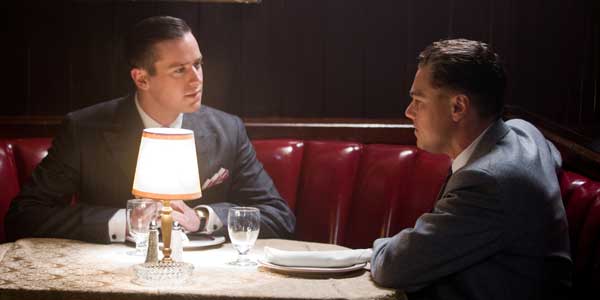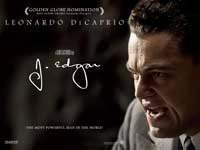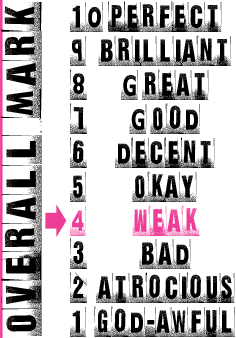
Director: Clint Eastwood
Running Time: 137 mins
Certificate: 15
Release Date: January 20th, 2012

There’s an old adage on the standup comedy circuit that the only thing worse than complete silence to greet your routine is a couple of stifled chuckles. This, they say, indicates that not only has your material failed, it has done so in such a way that the audience’s only response is to laugh at its failure.
Had Clint Eastwood, the director of J.Edgar attended the screening of his film that I did, he might have had a similar feeling. The last thing one would expect from a serious political biopic is moments of unintentional hilarity, but from the minute Leonardo DiCaprio appears on screen in an unconvincing elderly prosthetic, that’s exactly what you get.
J. Edgar Hoover is not an individual who provokes much contemplation in the UK, but to our American cousins he is as divisive a figure as Margaret Thatcher – herself getting the biopic treatment this awards season – is to us. Some admire his hardline stance in thwarting Bolshevik terrorism in America in the immediate aftermath of World War I and for pursuing corruption wherever he found it. Others condemn him for delusional paranoia that led both he and the institution that he founded, the FBI, to perceive threats where there were none and to wield his powerful knowledge to serve his own deranged agenda. If you can say one good thing about Eastwood’s film, it’s that it panders to neither of these views. Unfortunately, it fails to do anything else of any significance either.
Similar to Eastwood’s previous effort, the disastrous Hereafter, J. Edgar starts promisingly. Despite the unconvincing makeup, DiCaprio, as usual, is an engaging lead and his cutting delivery and haughty demeanour suit the burgeoning megalomania that is later revealed. The first act is filled with potential, as we watch a young J. Edgar scupper the left-wing radicals in effective but ethically dubious fashion.
After this things start to go awry. The introduction of Armie Hammer as Hoover’s second in command and alleged love interest Clyde Tolson is a necessary addition but one that inexplicably causes the entire film to fall flat on its face. The latent homosexual element to the relationship is handled in such a ham-fisted, sub-soap opera tone that it caused the unintentional giggling and guffawing mentioned earlier. There is one scene in particular, a confrontation featured heavily in the trailer, which is so laughably inept that it very nearly ruins the film on its own.
The narrative style, with the elderly Hoover dictating his memoirs to a young agent, is a staple of genre (see Alexander, Chaplin etc), but here it lacks cohesion, with the action jumping unevenly from one time to another. Perhaps the worst example is midway through the film when, in one scene, Hoover’s mother (Judi Dench) is seen gravely ill and apparently close to death. We then cut back to elderly Hoover, who talks about something unrelated, after which we are unceremoniously dumped back in the past, where young Hoover is attending a soirée with his now healthy mother in tow. It’s at best an oversight and at worst lazy storytelling and irresponsible direction and, frankly, Eastwood has enough statuettes on his mantle to know better.
Despite DiCaprio’s solid performance (although it’s been a while since an Academy Award has been so obviously angled for), the cast is largely under-used. Naomi Watts, a very capable actress by anyone’s standards, can do nothing with the under-written Helen Gandy, Hoover’s loyal-to-the-end personal secretary, and drifts anonymously through the piece. Likewise, Judi Dench, deprived of precious screen-time and robbed of any opportunity to establish any meaningful relationships or motives is wasted.
And so, sadly, the question must be asked, has Clint lost his touch? Prior to this, his last two contributions have been Invictus (unremarkable) and Hereafter (awful). Not only that, J. Edgar suffers in an almost identical way to Hereafter, a plodding and confused narrative and wholly unsympathetic characters. Indeed, it only raises itself above those depths by being fairly informative about its subject matter and partially redeeming itself near the end with a neat twist. The fact remains though that this is Eastwood’s second out-and-out dud in a row and one wonders when, if ever, he might get the old magic back.
Overall Verdict: DiCaprio’s fine performance is ruined by poor structure, unconvincing make-up and a laughable attempt to tackle unrequited and forbidden homosexuality. Avoid.
Reviewer: Alex Hall





Leave a Reply (if comment does not appear immediately, it may have been held for moderation)